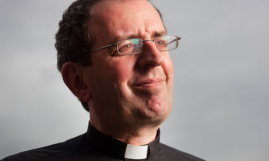
Katie Hopkins is a major media figure. You may not like that fact, but it remains a fact. She has a column in Britain's biggest selling newspaper, and now she has a TV show of her own. Since rising to prominence on The Apprentice she's managed to carve out a career as a controversialist which shows no sign of slowing down. Her enduring presence in the media comes from her notoriety, gained by a series of shocking statements which many of us find unpalatable, offensive and at times reprehensible. She's (absurdly) suggested it's right to judge children by their names, described dementia patients as 'bed blockers' and rails against all sorts of people who are vaguely different to 'the norm.'
So why was Katie Hopkins invited to partake in a Christian event? As a trustee of the organisation which puts on the Church and Media Conference I'd like to explain...
The conference has been happening for the last 39 years in various different guises. During that time it has attracted a wide range of speakers, mainly Christians, but also those of other faiths and none. It is primarily a place where we can discuss new developments in media, explore difficult issues and provide a chance to hear from people who work across the range of Christian and secular media in its traditional and new forms.
So, in one sense, it is perfectly understandable that we would invite Katie Hopkins. She's a high-profile figure and someone at the very centre of the increasingly polarised and harsh 'debate' (for want of a better word) which has been magnified by social media.
But I can also understand the critics who say it's a step too far. At a time when migrants are desperately trying to cross the Mediterranean and the English Channel why would we want to hear from someone who equated migrants to "cockroaches?" At a time when many Christians are gearing up for a serious conversation about assisted suicide, would it really be helpful to have Katie Hopkins offering her offensive and juvenile observations? Well, no. But that's not what we're doing. And I want to offer an explanation for why, in spite of the many arguments against her, we have invited her.
First, there is a biblical precedent. This isn't just some weak appeal to a sense of "what would Jesus do?" In most cases when that question is asked, we have no real idea what Jesus would do in a given contemporary situation. But in this case I think we do know. He regularly engaged with those with whom he passionately disagreed. He could have chosen to avoid interaction with the Pharisees. Instead, he took them on. The biblical example doesn't stop there. Paul didn't keep himself away from discussion. Quite the opposite, in fact. He headed straight into the heart of the contemporary debate (at Mars Hill). Paul gives us a great model of engagement. He went to the Areopagus and took on the pre-eminent law makers, opinion formers and philosophers of his day. "But Katie Hopkins isn't a pre-eminent philosopher," I hear you say! No, but she has over half a million Twitter followers and though many are disturbed by her opinions, there is a reason she has such a following – some people agree with her – and she helps to shape their views.
Hopkins is just a small part of the conference, and isn't being offered a fee. There are sessions planned with a whole range of experts from journalists to broadcasters, Members of Parliament, comedians and academics. It's a chance for Christians who work in media to network, to learn from each other and, yes, to debate and discuss important issues. I really hope the presence of one guest won't cast a shadow over that.
Finally, the context is important. Katie Hopkins is not being provided with a platform to say whatever she likes without challenge. She hasn't been invited to preach a sermon or give a keynote address. She will be interviewed by Torin Douglas, a vastly experience broadcaster and media commentator.
I don't think inviting someone to be interviewed equates to 'giving them a platform', or legitimising what she says. In fact, there's evidence to suggest it does the opposite. When BNP leader Nick Griffin was properly grilled on BBC Question time, he became a laughing stock and support for his racist party plummeted. But it's vital that we do put these views under the microscope, in a way that Mark Driscoll wasn't at Hillsong. I'm not equating either of these people with Hopkins, but pointing out that they're all controversial, and it strikes me that the best way to deal with their views is to ask tough questions rather than separate ourselves off completely in a 'holy huddle'. Katie Hopkins' style is to fire off provocative and ill-thought-out statements. The best way to respond isn't with like-for-like, but to demonstrate that there's a better way.
Katie Hopkins already has a platform. The choice we have is whether we just accept that and critique her from afar, or whether we invite her to have her views and her agenda challenged and explored. I'd argue it's better talk to her not about her. If we only ever spoke to people we agreed with, would anything change? On the other hand, is Katie Hopkins likely to be a less malign voice as a result of thoughtful Christian interaction? Just maybe...
















